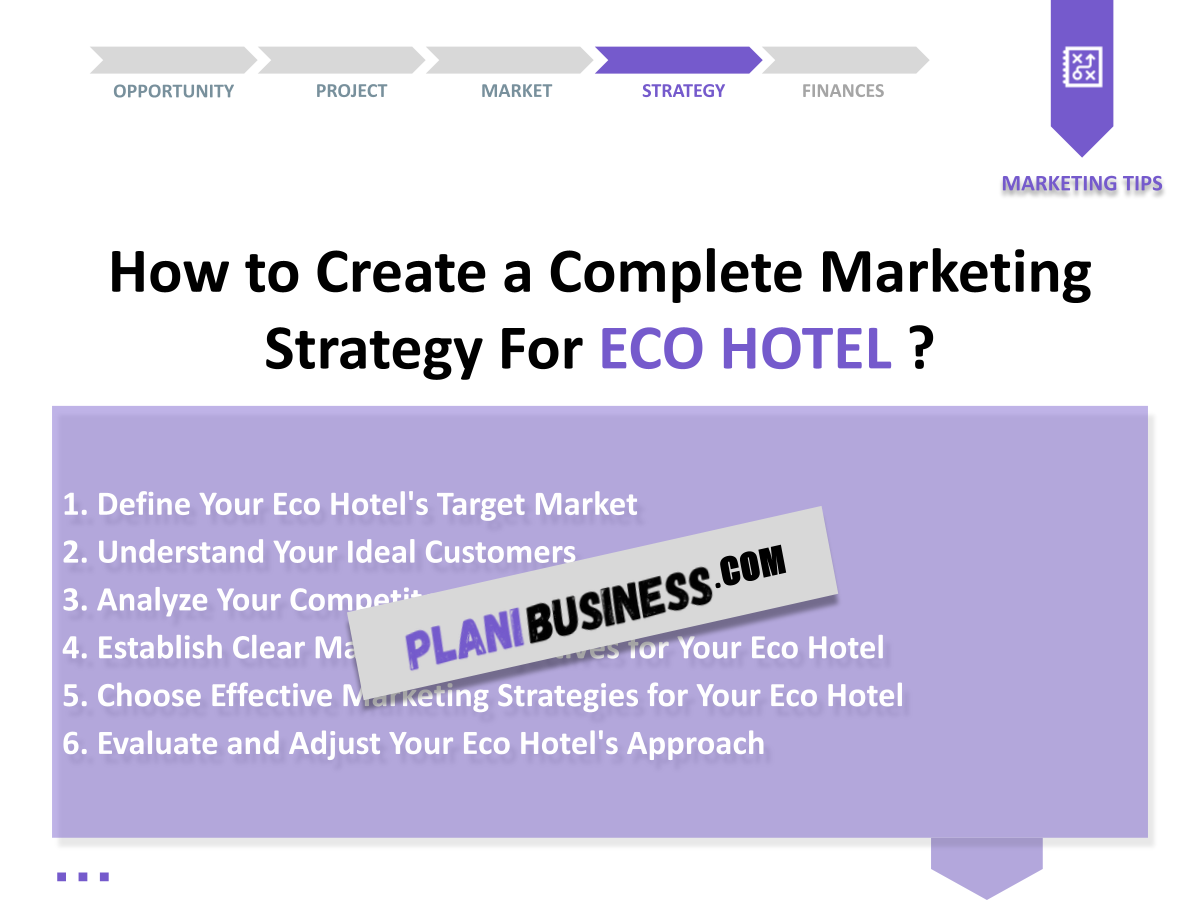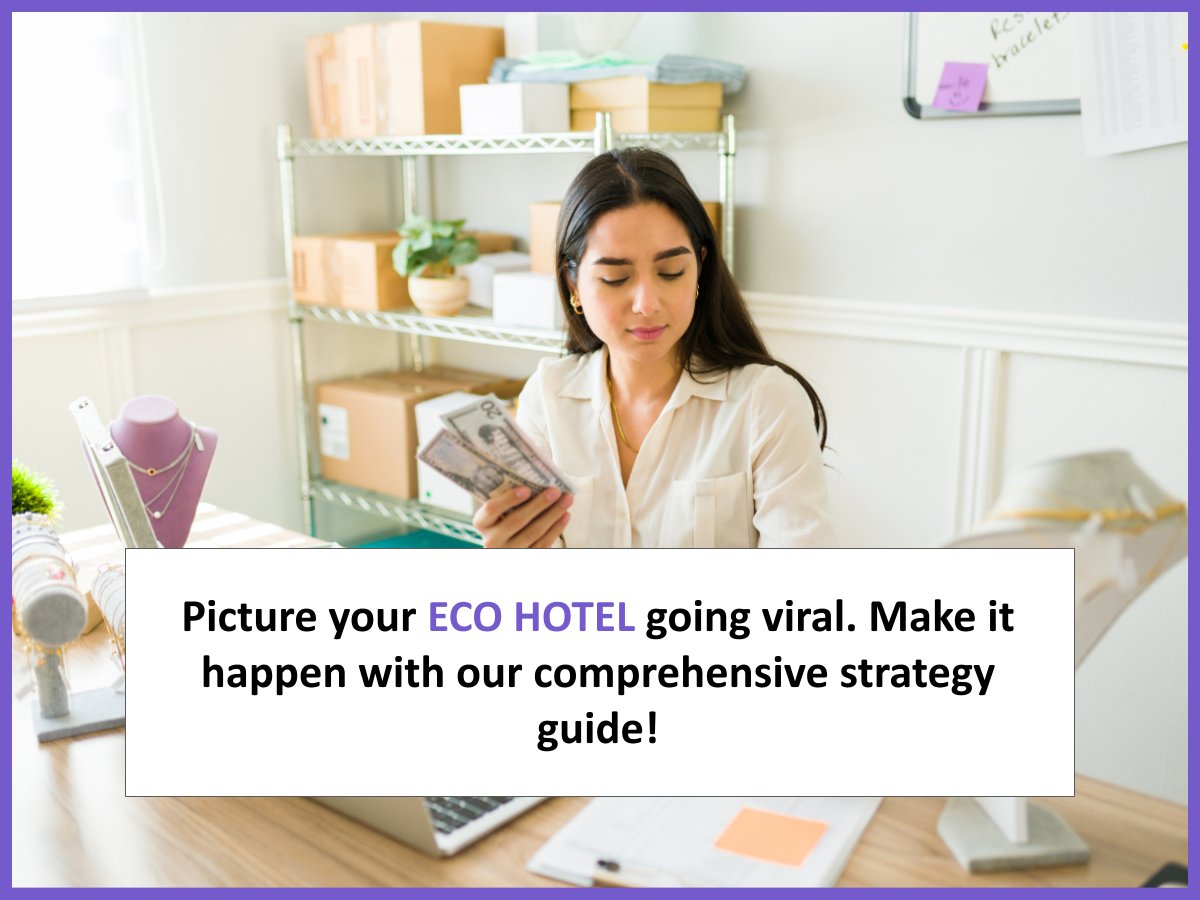Are you thinking about starting an eco hotel? You’re not alone! The demand for eco-friendly accommodations is on the rise as more travelers seek sustainable options. An Eco Hotel Marketing Plan is essential for attracting this conscious demographic and ensuring your hotel’s success. In this article, we’ll explore how to create a robust marketing strategy that resonates with eco-conscious travelers.
- Define your target market
- Understand your ideal customers
- Analyze your competitors
- Establish clear marketing objectives
- Choose effective marketing strategies
- Evaluate and adjust your approach
1. Define Your Eco Hotel’s Target Market
| Aspect | Details |
|---|---|
| Demographics | Age, income, and education level of your target audience |
| Psychographics | Interests, values, and lifestyle choices of potential guests |
Understanding your target market is crucial for developing an effective Eco Hotel Marketing Plan. This involves digging deep into who your ideal guests are and what they are looking for in a sustainable hotel experience. You might find that your guests are not just interested in a place to stay; they want an experience that aligns with their values. This means considering factors like their environmental impact, wellness needs, and desire for authentic local experiences.
Start by creating a customer persona. This can be a fictional character that embodies your typical guest. For example, you might have “Eco Emma,” a 30-year-old traveler who prioritizes sustainability and is willing to pay a premium for eco-friendly amenities. By doing this, you can better tailor your marketing messages to resonate with her and others like her.
2. Understand Your Ideal Customers
| Customer Type | Characteristics |
|---|---|
| Eco-conscious Travelers | Prioritize sustainability in their travel choices |
| Luxury Seekers | Desire upscale amenities while maintaining eco-friendliness |
By defining your ideal customers, you can tailor your marketing messages to resonate with them. This step is essential for a successful Eco Hotel Marketing Plan. Consider what drives these customers to choose eco hotels over traditional ones. Is it the allure of unique experiences? Or perhaps the peace of mind that comes from knowing their stay is environmentally friendly?
Gather insights through surveys, interviews, or online research. Ask questions like, “What factors influence your decision when booking a hotel?” or “How important is sustainability in your travel choices?” This information will help you create marketing campaigns that speak directly to your customers’ needs and desires.
In conclusion, understanding your target market and ideal customers is the foundation of your Eco Hotel Marketing Plan. It allows you to craft messages that attract and engage your audience effectively.
3. Analyze Your Competitors
| Competitor | Strengths | Weaknesses |
|---|---|---|
| Competitor A | Strong online presence | Limited eco-certifications |
| Competitor B | Excellent guest reviews | High pricing |
| Competitor C | Unique eco-friendly experiences | Low brand awareness |
Analyzing your competitors helps you identify gaps in the market that your eco hotel can fill, allowing for a more robust Eco Hotel Marketing Plan. Take time to research who your competitors are, what they offer, and how they market themselves. This can give you valuable insights into what works and what doesn’t.
Look at their websites, social media presence, and guest reviews. What do customers love about their experiences? Are there common complaints? This information will not only help you understand your competition but also give you ideas on how to differentiate your eco hotel. Perhaps you can offer unique amenities or sustainable practices that they lack.
For example, if you notice that a competitor has great reviews for their organic restaurant but struggles with their online booking system, you could focus on enhancing your booking experience while also promoting your own sustainable dining options. This strategic analysis is vital for positioning your eco hotel effectively in the marketplace.
4. Establish Clear Marketing Objectives for Your Eco Hotel
| Objective | Measure of Success |
|---|---|
| Increase bookings by 20% | Track monthly booking rates |
| Boost social media engagement by 30% | Monitor likes, shares, and comments |
| Enhance customer retention by 15% | Analyze repeat guest statistics |
Clear objectives provide direction for your marketing efforts and allow you to measure success effectively. They are a fundamental part of any Eco Hotel Marketing Plan. When setting these objectives, make sure they are SMART: Specific, Measurable, Achievable, Relevant, and Time-bound.
For example, instead of a vague goal like “improve marketing,” aim for something concrete like “increase bookings by 20% within the next six months.” This gives you a clear target to work towards and allows you to measure your progress along the way. It also helps in adjusting strategies if you find you’re not on track to meet your goals.
Additionally, consider how each marketing objective ties into your overall business goals. For instance, if your aim is to enhance sustainability, a related marketing objective could be to promote your eco-friendly practices, which may attract more guests interested in green travel.
In summary, establishing clear marketing objectives is essential for creating a focused and effective Eco Hotel Marketing Plan. They guide your strategy and ensure that every action you take moves you closer to your business goals.
5. Choose Effective Marketing Strategies for Your Eco Hotel
| Strategy | Details |
|---|---|
| Content Marketing | Create blog posts about eco-friendly travel tips |
| Social Media Campaigns | Engage audiences on platforms like Instagram and Facebook |
| Email Marketing | Send newsletters featuring eco-friendly tips and promotions |
By choosing the right marketing strategies, you can effectively communicate your eco-friendly message and attract more guests. A well-rounded approach to marketing is crucial for your Eco Hotel Marketing Plan. Here are some strategies to consider:
- Content Marketing: Develop a blog that shares valuable insights on sustainable travel, eco-friendly practices, and local attractions. This not only positions you as an authority in the eco-tourism space but also helps with SEO, making your hotel more visible online.
- Social Media Campaigns: Utilize platforms like Instagram and Facebook to showcase your hotel’s unique offerings. Share stunning images of your eco-friendly amenities and engage with your audience through contests or eco-related challenges.
- Email Marketing: Build a mailing list and send out regular newsletters. Include tips for sustainable travel, promotions, and updates about your hotel. This keeps your guests informed and encourages repeat visits.
Implementing these strategies can enhance your hotel’s visibility and attract the right guests who value sustainability.
6. Evaluate and Adjust Your Eco Hotel’s Approach
| Evaluation Method | Details |
|---|---|
| Guest Surveys | Gather feedback on guest experiences |
| Website Analytics | Track visitor behavior and conversion rates |
| Social Media Insights | Analyze engagement rates and audience demographics |
Regular evaluation allows you to adjust your marketing tactics based on real-time data, ensuring your Eco Hotel Marketing Plan remains effective. It’s essential to implement a systematic approach for assessing your marketing efforts.
Start by utilizing guest surveys to gather feedback on their experiences. Questions could include their thoughts on your eco-friendly practices or what amenities they found most appealing. This direct feedback is invaluable for making improvements.
In addition, leverage website analytics to monitor visitor behavior. Are potential guests engaging with your content? Are they converting into bookings? Understanding these metrics helps you refine your marketing strategies. For instance, if you notice a high bounce rate on your booking page, it might be time to simplify the process.
Lastly, keep an eye on your social media insights. Analyze engagement rates to determine which posts resonate most with your audience. This can guide your content creation moving forward and help you tailor your messaging to better connect with your ideal customers.
In summary, evaluating and adjusting your approach is crucial for maintaining an effective Eco Hotel Marketing Plan. By continuously seeking feedback and analyzing data, you can ensure your strategies align with guest expectations and market trends.
7. Example N°1 of Marketing Plan for Eco Hotel
| Steps | Actions | Details |
|---|---|---|
| 1 | Target Market | Identify eco-conscious travelers |
| 2 | Ideal Customers | Focus on sustainability enthusiasts |
| 3 | Competitors | Research local eco hotels |
| 4 | Marketing Objectives | Set a goal to increase eco certifications |
| 5 | Marketing Strategies | Implement social media campaigns |
| 6 | Evaluation | Conduct quarterly surveys |
Let’s dive into a practical example of a marketing plan for an eco hotel. This plan focuses on attracting eco-conscious travelers who prioritize sustainability in their travel choices. The first step is to clearly define the target market. You want to identify guests who are not only interested in a place to stay but also in the impact of their choices on the environment.
Next, consider your ideal customers. Focus on sustainability enthusiasts, such as those who actively seek eco-friendly accommodations and value green practices. Research your competitors to understand what they are doing well and where you can differentiate your hotel.
Establish marketing objectives that align with your business goals. For instance, aim to increase your eco certifications, which can enhance your credibility and appeal to environmentally conscious guests. Once you have your objectives set, implement effective marketing strategies. Social media campaigns can be particularly powerful in showcasing your hotel’s unique offerings and engaging potential guests.
Finally, it’s crucial to evaluate your efforts regularly. Conduct quarterly surveys to gather feedback from your guests. This will not only help you understand their experiences but also identify areas for improvement in your Eco Hotel Marketing Plan.
8. Example N°2 of Marketing Plan for Eco Hotel
| Steps | Actions | Details |
|---|---|---|
| 1 | Target Market | Focus on family travelers |
| 2 | Ideal Customers | Target families interested in eco-tourism |
| 3 | Competitors | Analyze family-friendly eco hotels |
| 4 | Marketing Objectives | Increase family bookings by 15% |
| 5 | Marketing Strategies | Offer family packages |
| 6 | Evaluation | Review family feedback |
In this second example, let’s focus on a marketing plan aimed at family travelers. The first step is to define your target market by identifying families who are interested in eco-tourism. Families are increasingly looking for vacations that not only provide fun but also educate their children about sustainability.
Next, develop a clear picture of your ideal customers. Target families who prioritize eco-friendly travel and are looking for accommodations that support their values. It’s important to analyze competitors that offer family-friendly eco hotels to understand what they do well and what you can improve upon.
Set specific marketing objectives, such as increasing family bookings by 15%. This gives you a concrete goal to work towards. One effective strategy could be to create special family packages that include activities focused on sustainability, such as guided nature walks or workshops on eco-friendly practices.
Finally, evaluate your success by reviewing feedback from families who stay at your hotel. Understanding their experiences will help you refine your Eco Hotel Marketing Plan and better cater to this important segment of travelers.
9. Example N°3 of Marketing Plan for Eco Hotel
| Steps | Actions | Details |
|---|---|---|
| 1 | Target Market | Identify millennials |
| 2 | Ideal Customers | Eco-conscious young adults |
| 3 | Competitors | Research millennial-friendly hotels |
| 4 | Marketing Objectives | Grow social media following by 25% |
| 5 | Marketing Strategies | Engage influencers for promotions |
| 6 | Evaluation | Track engagement metrics |
In this example, we will focus on a marketing plan tailored for millennials, a demographic that increasingly values sustainability. The first step is to define your target market by identifying millennials who prioritize eco-friendly travel options. This generation often seeks experiences that align with their values, making them a prime audience for your eco hotel.
Next, create a detailed profile of your ideal customers. Eco-conscious young adults are often adventurous and eager to learn about sustainable practices. Understanding their motivations will help you craft marketing messages that resonate with them. Researching your competitors who cater to millennials can also provide insights into successful strategies and areas for differentiation.
Set clear marketing objectives, such as growing your social media following by 25%. This is an achievable target that can enhance your brand visibility among young travelers. Engaging influencers who share your commitment to sustainability can amplify your reach and credibility in this demographic. They can create authentic content that showcases your hotel’s eco-friendly practices and unique experiences.
Lastly, it’s essential to evaluate your marketing efforts by tracking engagement metrics on social media platforms. Monitoring likes, shares, and comments will help you assess which content resonates best with your audience, allowing you to refine your Eco Hotel Marketing Plan accordingly.
10. Example N°4 of Marketing Plan for Eco Hotel
| Steps | Actions | Details |
|---|---|---|
| 1 | Target Market | Focus on adventure seekers |
| 2 | Ideal Customers | Eco-friendly adventure travelers |
| 3 | Competitors | Analyze adventure-based eco hotels |
| 4 | Marketing Objectives | Boost adventure package bookings by 20% |
| 5 | Marketing Strategies | Host eco-adventure events |
| 6 | Evaluation | Assess event feedback |
This example focuses on creating a marketing plan aimed at adventure seekers. The first step is to define your target market by identifying eco-friendly adventure travelers who are looking for unique experiences that combine their love for nature with sustainability.
Next, develop a clear understanding of your ideal customers. These travelers are often interested in activities such as hiking, kayaking, or wildlife tours that promote environmental awareness. Research your competitors, especially those who offer adventure-based eco hotels, to see how they market their experiences.
Set marketing objectives that align with your business goals, such as boosting adventure package bookings by 20%. This provides a specific target to work towards and can guide your marketing efforts. One effective strategy could be to host eco-adventure events, such as guided nature hikes or eco-crafting workshops, that attract adventure seekers and showcase your hotel’s commitment to sustainability.
Finally, evaluate the success of your marketing initiatives by assessing feedback from event participants. Gathering insights on their experiences can help you refine your Eco Hotel Marketing Plan and ensure that you are meeting the expectations of your adventurous guests.
11. Example N°5 of Marketing Plan for Eco Hotel
| Steps | Actions | Details |
|---|---|---|
| 1 | Target Market | Identify corporate travelers |
| 2 | Ideal Customers | Eco-conscious business professionals |
| 3 | Competitors | Analyze eco-friendly corporate hotels |
| 4 | Marketing Objectives | Increase corporate bookings by 10% |
| 5 | Marketing Strategies | Offer corporate green packages |
| 6 | Evaluation | Review corporate feedback |
This example outlines a marketing plan specifically for corporate travelers. The first step is to identify your target market by focusing on eco-conscious business professionals who value sustainability during their travels. Many companies are prioritizing green practices, and offering a sustainable hotel option can align with their values.
Next, define your ideal customers. These are individuals who often travel for work but also seek to minimize their environmental impact. Research competitors that cater to corporate clients and see how they market their eco-friendly amenities and services.
Set clear marketing objectives, such as increasing corporate bookings by 10%. This target will guide your strategies and provide a benchmark for success. One effective strategy could be to offer corporate green packages that include meeting spaces with sustainable features, organic catering options, and opportunities for team-building activities focused on environmental stewardship.
Finally, evaluate your marketing efforts by reviewing feedback from corporate guests. Understanding their experiences can help you refine your Eco Hotel Marketing Plan and ensure you are meeting the needs of this important segment.
12. Example N°6 of Marketing Plan for Eco Hotel
| Steps | Actions | Details |
|---|---|---|
| 1 | Target Market | Focus on couples |
| 2 | Ideal Customers | Eco-friendly couples looking for romance |
| 3 | Competitors | Explore romantic eco hotels |
| 4 | Marketing Objectives | Increase couple bookings by 15% |
| 5 | Marketing Strategies | Promote romantic eco-getaways |
| 6 | Evaluation | Gather couple feedback |
In this example, we will create a marketing plan aimed at couples seeking romantic getaways. Start by identifying your target market, focusing on eco-friendly couples who prioritize sustainability in their travel choices. Many couples are looking for unique experiences that allow them to connect with nature while enjoying quality time together.
Next, define your ideal customers. These couples are often interested in romantic settings that offer eco-friendly amenities and activities. Research competitors that cater to romantic eco hotels to understand their offerings and pricing strategies.
Set specific marketing objectives, such as increasing couple bookings by 15%. This provides a clear target to aim for. One effective strategy could be to promote romantic eco-getaway packages that include candlelit dinners made from local ingredients, spa treatments using organic products, and guided nature walks.
Finally, evaluate your marketing success by gathering feedback from couples who stay at your hotel. Understanding their experiences can help you refine your Eco Hotel Marketing Plan to better meet the desires of this audience.
13. Example N°7 of Marketing Plan for Eco Hotel
| Steps | Actions | Details |
|---|---|---|
| 1 | Target Market | Identify solo travelers |
| 2 | Ideal Customers | Eco-conscious solo adventurers |
| 3 | Competitors | Research solo-friendly eco hotels |
| 4 | Marketing Objectives | Grow solo traveler bookings by 12% |
| 5 | Marketing Strategies | Offer solo traveler discounts |
| 6 | Evaluation | Monitor solo traveler feedback |
This final example focuses on a marketing plan tailored for solo travelers. The first step is to define your target market by identifying eco-conscious solo adventurers who seek experiences that align with their values. Many solo travelers are looking for opportunities to explore while minimizing their environmental impact.
Next, create a profile of your ideal customers. These individuals often seek unique and personal experiences that allow them to connect with nature. Research competitors that focus on solo-friendly eco hotels to understand their offerings and pricing.
Set clear marketing objectives, such as growing solo traveler bookings by 12%. This provides a specific goal to work towards and helps guide your marketing strategies. One effective approach could be to offer discounts for solo travelers, making your eco hotel an attractive option for those traveling alone.
Finally, evaluate your marketing efforts by monitoring feedback from solo travelers. Understanding their experiences will help you refine your Eco Hotel Marketing Plan and ensure that you are meeting the needs of this unique audience.
Conclusion
In conclusion, creating a successful Eco Hotel Marketing Plan involves understanding your target market, defining your ideal customers, analyzing competitors, and establishing clear marketing objectives. By implementing effective marketing strategies tailored to specific demographics, such as eco-conscious travelers, families, millennials, and corporate clients, you can significantly enhance your hotel’s visibility and attract the right guests.
To further assist you in your journey, consider utilizing a comprehensive business plan template designed specifically for eco hotels. Check out this good business plan template for Eco Hotel that can guide you through the process of structuring your marketing and operational efforts effectively.
Additionally, you might find our articles helpful in expanding your knowledge: learn about How to Develop an Eco Hotel? and explore strategies for conducting a SWOT analysis for Eco Hotel. These resources can provide valuable insights as you embark on your eco-friendly hospitality journey.
FAQ
- What is an Eco Hotel?
An eco hotel is an establishment that focuses on sustainability and environmental responsibility, offering eco-friendly amenities and practices that minimize their impact on the environment. - How can I market my Eco Hotel effectively?
To market your Eco Hotel effectively, identify your target market, leverage social media, create engaging content, and establish partnerships with eco-friendly organizations. - What are the benefits of staying in an Eco Hotel?
Guests at eco hotels enjoy unique experiences that promote sustainability, often have access to locally sourced food, and contribute to conservation efforts. - How do I identify my Eco Hotel’s target market?
Conduct market research to understand the demographics, interests, and values of potential guests who prioritize sustainability when choosing accommodations. - What marketing strategies work best for Eco Hotels?
Content marketing, social media engagement, partnerships with local businesses, and email campaigns are effective strategies for promoting an Eco Hotel. - How can I enhance guest experiences at my Eco Hotel?
Focus on providing personalized services, unique eco-friendly amenities, and engaging activities that align with your guests’ values and interests. - What role does social media play in Eco Hotel marketing?
Social media is crucial for showcasing your hotel’s sustainability efforts, sharing guest experiences, and connecting with a community that values eco-friendly practices. - How do I measure the success of my Eco Hotel marketing efforts?
Utilize analytics tools to track metrics such as booking rates, website traffic, social media engagement, and guest feedback to evaluate the effectiveness of your marketing strategies. - What certifications should an Eco Hotel have?
Consider obtaining certifications from recognized organizations that focus on sustainability, such as LEED, Green Key, or EarthCheck, to enhance credibility. - How can I create a sustainable business model for my Eco Hotel?
Develop a business plan that outlines your sustainability goals, marketing strategies, and operational practices that align with eco-friendly principles.







